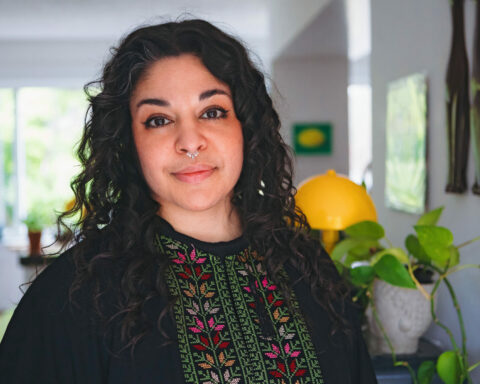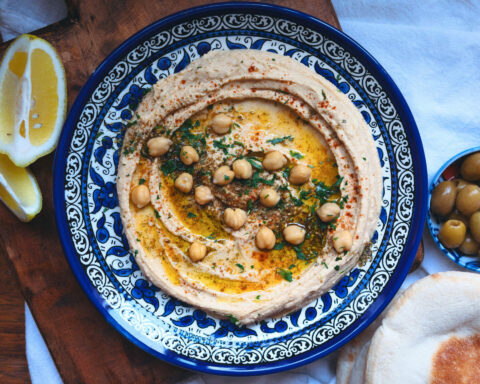Culinary Connections celebrates all the ways food influences our lives and our connection to community and land. Join us as we feature stories from Northwest Harvest’s staff and their culinary heritages.
April is Arab American month, a month to celebrate the rich culture and abundant contributions of Arab communities in the United States. In this current climate of xenophobia and increased Islamophobia, it’s crucial to educate, challenge racist stereotypes, and empower upcoming generations of Arab Americans to strengthen their connection to their heritage.
In honor of Arab American Heritage Month, we sat down with our very own Digital Content and Social Media Manager, Laila Al-Agha, as she shared stories of food, connection, and family.
Baqoon ma baqiya al Za’atar wal zaytoun/باقون ما بقي الزعتر و الزيتون
We remain as long as za’atar and olive oil remain.
 Laila Al-Agha, Northwest Harvest’s Digital Content and Social Media Manager, believes strongly in the power of food to connect people and distant lands across time. Laila, born and raised in a small town in Louisiana, is both Palestinian and Venezuelan and inherited a rich and flavorful culinary heritage. Her family of six grew up food insecure: her father worked at the local university and her mother was home raising Laila and her siblings. They lived in university housing along with other adjunct faculty and their families. During her childhood, Laila’s father was the primary cook of the family and took great pride in his craft. He grew up cooking in his home kitchen in Gaza with his mother and has kept the family tradition alive. He loved to perfect recipes and host dinner parties for their friends and neighbors. Community members were always delighted to share a meal with the Al-Aghas.
Laila Al-Agha, Northwest Harvest’s Digital Content and Social Media Manager, believes strongly in the power of food to connect people and distant lands across time. Laila, born and raised in a small town in Louisiana, is both Palestinian and Venezuelan and inherited a rich and flavorful culinary heritage. Her family of six grew up food insecure: her father worked at the local university and her mother was home raising Laila and her siblings. They lived in university housing along with other adjunct faculty and their families. During her childhood, Laila’s father was the primary cook of the family and took great pride in his craft. He grew up cooking in his home kitchen in Gaza with his mother and has kept the family tradition alive. He loved to perfect recipes and host dinner parties for their friends and neighbors. Community members were always delighted to share a meal with the Al-Aghas.
Laila’s father passed his love of cooking, his generosity, and his hospitality to his children. Laila watched her father in the kitchen and, when they were old enough, she and her sister joined him as sous chefs. By the time she reached high school, and having perfected her prep game, Laila dreamed of becoming a chef. Like her father, she started hosting her own dinner parties in college. The tradition of sharing food with the community continues!
Food connects Laila to her family, near and far. Though her family did everything they could to make the difficult, arduous, expensive, and dangerous journey to her father’s homeland in Khan Younis as often as they could, visits were infrequent. The border crossing into Gaza through Egypt was unpredictable and nerve-wracking – there was never a guarantee that they would be allowed to cross on their assigned day and there were always lurking fears of their family being separated.
Despite having limited physical connection to her homeland and her family in Palestine, where the Al-Agha name was well known and held in high regard, Laila is able to access some of the sights, smells, tastes, and feelings through traditional Palestinian meals. Olives, almonds, grapes, and potatoes call forth the memories of orchards full of fruit trees and farmlands bursting with produce, grown in the nutrient dense soil of the Fertile Crescent. Homemade hummus, the complex flavor of za’atar, and falafel reminds her of her history, the roots of the mint and sage used to make tea root her to her heritage. Land, and the people who tend it, play a significant role in connecting Laila to her family across space and time.
 When asked what role food plays in her life these days, as a proud Palestinian woman living in the United States, Laila remarked: “It is a way to express joy, connect with my own passions, a way to welcome and care for the people who eat my food. I have a personal, emotional connection to food, and a distinctly political connection as well: in Arab cultures, unexpected guests are always expected, and meals are meant to be eaten together. There are no dining tables in Palestine,” Laila explains. “Traditionally food is served on huge platters, and everyone – grandparents, children, cousins, neighbors, friends – eats together with their hands. The belief that there is more when we share, and that there is always enough for an extra guest is deeply important to me. I see so much of Palestinian culture in the way we grow, prepare, and share food: there is resourceful self-reliance and caring community. There is resilience, resistance, and vibrancy cooked into the heart of every meal, and that connection is more important to me now than ever.”
When asked what role food plays in her life these days, as a proud Palestinian woman living in the United States, Laila remarked: “It is a way to express joy, connect with my own passions, a way to welcome and care for the people who eat my food. I have a personal, emotional connection to food, and a distinctly political connection as well: in Arab cultures, unexpected guests are always expected, and meals are meant to be eaten together. There are no dining tables in Palestine,” Laila explains. “Traditionally food is served on huge platters, and everyone – grandparents, children, cousins, neighbors, friends – eats together with their hands. The belief that there is more when we share, and that there is always enough for an extra guest is deeply important to me. I see so much of Palestinian culture in the way we grow, prepare, and share food: there is resourceful self-reliance and caring community. There is resilience, resistance, and vibrancy cooked into the heart of every meal, and that connection is more important to me now than ever.”
On the final day of April, please join us in honoring and celebrating the many important achievements and contributions of Arab Americans to the United States, past and present.
